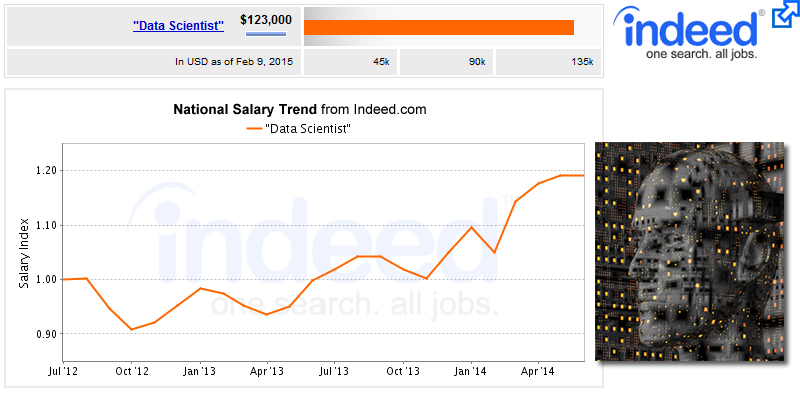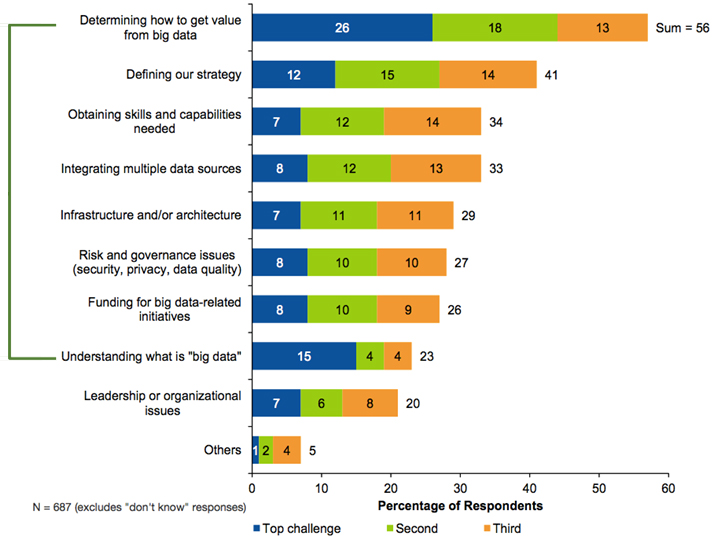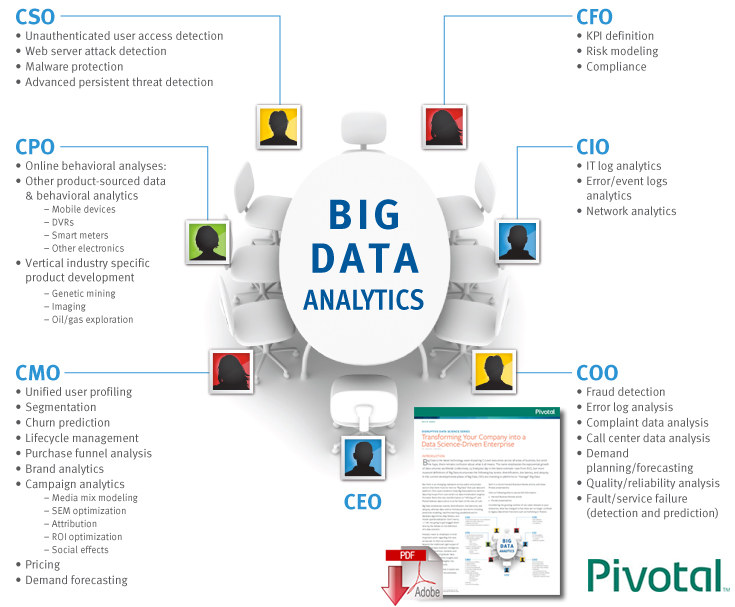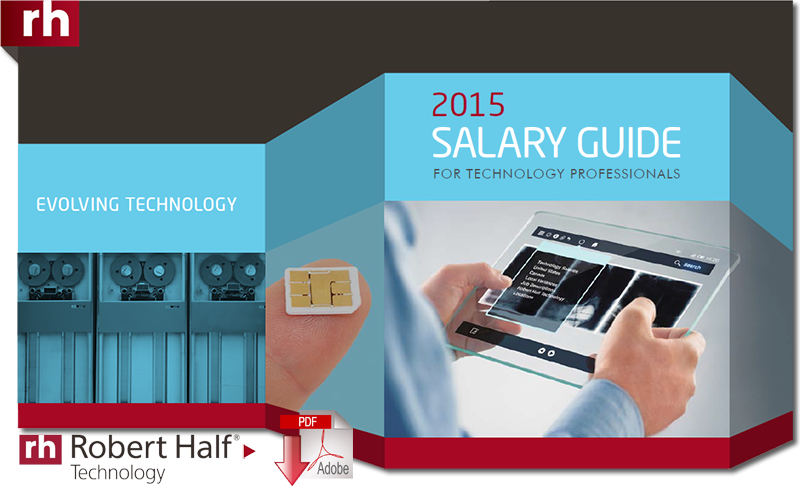Yes, CEOs make more, coming in at a median salary of $740,589. But among the jobs available to the remaining 99.999% of us, data-scientist salaries are hard to beat.
In fact, for job postings nationwide, data-scientist salaries are 113% more than average salaries for all job postings, according to Indeed.com.
But while “data science” may sound cut-and-dried to outsiders, the practitioners who really deserve their big bucks are anything but. Making data science sing is a matter of mastering statistics, math and programming, and then deploying them to derive insights using the same business understanding - and gut instinct - that drives most company-executive decisions.
Which, of course, means that only a fraction of data scientists do their jobs well.
Data Is Money
The average data scientist today earns $123,000 a year, according to Indeed.com. But the operating term here is “today,” since data science has paid increasing dividends since it really burst into business consciousness in 2012.
Average Salary of Jobs Matching “Data Scientist”
Average “Data Scientist” salaries for job postings nationwide are 113% higher than average salaries for all job postings nationwide.

Source: indeed
This corresponds with increasing frustration as organizations struggle to make sense of their data, a fact highlighted in a Gartner report on Big Data adoption.
When asked what the biggest Big Data challenges are, most of the answers roughly translate to, “We have no idea what we’re doing.”
Top Big Data Challenges
Translation? Most struggle to know what Big Data is, how to manage it and who can manage it.

Source: Gartner
I don’t want to depress you, but it’s just going to get worse. Ninety percent of the world’s information was created in the last two years. Eighty percent of all enterprise data is unstructured, which means it’s not the neat and tidy data that for decades has been held in relational databases, which in turn plug nicely into “business intelligence” tools, enterprise data warehouses and other traditional data analytics systems.
Today’s data needs different tools. And it requires a different sort of data scientist.
A Very Hard Role To Fill
It’s not surprising that data scientists get paid so much. After all, they’re extraordinarily hard to find, given the combination of skills necessary to do data science well. While there’s some truth to the joke that “a data scientist is a data analyst that lives in California,” it’s also true that data science is real - and really hard.
The reason is that data science, done right, involves three different areas of expertise.
As Mitchell Sanders notes, a good data scientist blends domain knowledge (i.e., they know the banking or retail or whatever industry they operate in), math and statistics expertise, and programming skills. Too many organizations think that they just need one of these areas covered. In fact, far too many overlook the people already within their own organizations: those that have the domain knowledge necessary to asking intelligent questions of their data.
This is why I’ve long agreed with Gartner analyst Svetlana Sicular’s assertion that “companies should look within” for data scientists. As she notes, “Organizations already have people who know their own data better than mystical data scientists.” (Or, as Sicular also notes, “Learning Hadoop is easier than learning the company’s business.”
Such context is critical, but not sufficient, as Sanders stresses:
Understanding correlation, multivariate regression and all aspects of massaging data together to look at it from different angles for use in predictive and prescriptive modeling is the backbone knowledge that’s really step one of revealing intelligence…. If you don’t have this, all the data collection and presentation polishing in the world is meaningless.
While some companies purport to be able to fill in data science knowledge gaps, the reality is that data science is hard ... and hence richly rewarded.
Human, All Too Human
Still, given the difficulty of deciphering meaning in mountains of data, it must be frustrating for data scientists to regularly see gut instinct trump data, as a new study by Fortune Knowledge Group reveals. The survey of 720 senior business leaders found that 62% of business leaders said they tend to trust their gut, and 61% said real-world insight tops hard analytics when making decisions.
In other words, they rely on real-time application of domain knowledge to hard problems facing their organizations.
It doesn’t have to be this way. For data scientists who want to truly earn their $123,000 salary, they need to figure out ways to marry statistics, math and code to the “softer” world of instinct born of experience. Those who figure this out will be able to not only ask and answer harder questions, but they’ll also find their C-level executives more likely to heed their advice.
There Are Lots of Jobs & Then There are Better Jobs
James M. Connolly
The hiring and recruitment business is a strange beast. It’s an area where the customer’s (employer) demand doesn’t always translate into top dollar prices (salary).
You would think that where employers have the most need would lead to the biggest paydays. Yet, when we talk about big data and related data fields, the potential big paydays are there, but maybe those jobs aren’t the toughest to fill after all.
That is revealed in some kind of quirky numbers in the annual Robert Half Technology Salary Guide. Average US salaries for big data engineers and data architects rank high, and are among the jobs showing the highest growth in salary for 2015. Yet, the jobs that are most in demand from region to region tend to be those old familiar roles of web developer, .Net developer, even desktop support analyst and systems administrator.
Only in the Pacific region does the role of big data engineer show up among the five most in-demand jobs for nine US regions. So, maybe the advice about going West really does apply to analytics professionals, with Silicon Valley still being the place to be.
However, I don’t think this means that the big data talent gap nationwide is a complete sham. Rather, I suspect that big data related hiring is in a position where momentum is building more slowly than we have heard, and where companies are willing to pay a premium to get in on a few analytics professionals who can have a direct impact on corporate results, whether by helping to identify new revenue sources or finding operational efficiencies.
The average salaries that Robert Half is finding cover a fairly broad range, varying from region to region (see all salary guides). Take the examples of data architect and big data engineer, where salaries for each role range from just over $119,000 to the mid and upper $160,000s. Those averages are up over 2014’s figures by 7.2% and 9.3% respectively.
Yet, the big data roles still lag behind the chief security officer positions, which come in at $134,250 to $204,750. Analyzing corporate data is important, but protecting it still matters more.
As for the jobs that a most in demand, like web developer, .Net developer, and desktop support, the average salaries being offered are coming in well below the big data related positions.
So, maybe one takeaway from this research is that if you need “a job” those more traditional IT roles still need to be filled. If you want “the job” that brings in the big pay check, you have to do build up those big data skillsets.
Take a look at how your job and your region stack up in the survey, and then share a comment on how well the numbers match your reality.
Source: All Analytics
Download the Paper: Transforming Your Company into a Data Science-Driven Enterprise

Article topics
Email Sign Up


















